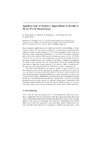Identificador persistente para citar o vincular este elemento:
https://accedacris.ulpgc.es/jspui/handle/10553/45239
| Título: | Applications of genetic algorithms in realistic wind field simulations | Autores/as: | Montenegro, Rafa Montero, G. Rodriguez, E. Escobar, J. M. González-Yuste, J. M. |
Clasificación UNESCO: | 12 Matemáticas | Palabras clave: | Genetic Algorithm Control Point Wind Velocity Turbulence Intensity Planetary Boundary Layer |
Fecha de publicación: | 2008 | Proyectos: | Simulacion Numerica de Campos de Viento Orientados A Procesos Atmofericos. | Publicación seriada: | Studies in Computational Intelligence | Resumen: | Mass consistent models have been widely use in 3-D wind modelling by finite element method. We have used a method for constructing tetrahedral meshes which are simultaneously adapted to the terrain orography and the roughness length by using a refinement/derefinement process in a 2-D mesh corresponding to the terrain surface, following the technique proposed in [14,15,18]. In this 2-D mesh we include a local refinement around several points which are previously defined by the user. Besides, we develop a technique for adapting the mesh to any contour that has an important role in the simulation, like shorelines or roughness length contours [3,4], and we refine the mesh locally for improving the numerical solution with the procedure proposed in [6]. This wind model introduces new aspects on that proposed in [16, 19, 20]. The characterization of the atmospheric stability is carried out by means of the experimental measures of the intensities of turbulence. On the other hand, since several measures are often available at a same vertical line, we have constructed a least square optimization of such measures for developing a vertical profile of wind velocities from an optimum friction velocity. Besides, the main parameters governing the model are estimated using genetic algorithms with a parallel implementation [12,20,26]. In order to test the model, some numerical experiments are presented, comparing the results with realistic measures. | URI: | https://accedacris.ulpgc.es/handle/10553/45239 | ISBN: | 978-3-540-77474-7 978-3-540-77475-4 |
ISSN: | 1860-949X | DOI: | 10.1007/978-3-540-77475-4_11 | Fuente: | Studies in Computational Intelligence [ISSN 1860-949X], v. 102, p. 165-182 |
| Colección: | Artículos |
Citas SCOPUSTM
2
actualizado el 08-jun-2025
Citas de WEB OF SCIENCETM
Citations
2
actualizado el 25-feb-2024
Visitas
300
actualizado el 15-ene-2026
Descargas
208
actualizado el 15-ene-2026
Google ScholarTM
Verifica
Altmetric
Comparte
Exporta metadatos
Los elementos en ULPGC accedaCRIS están protegidos por derechos de autor con todos los derechos reservados, a menos que se indique lo contrario.
